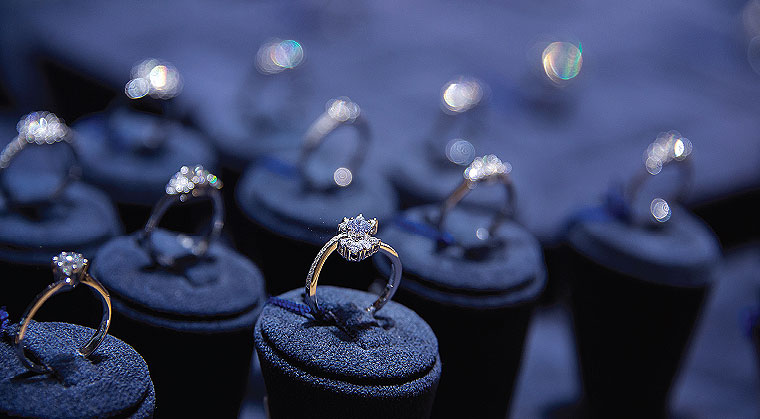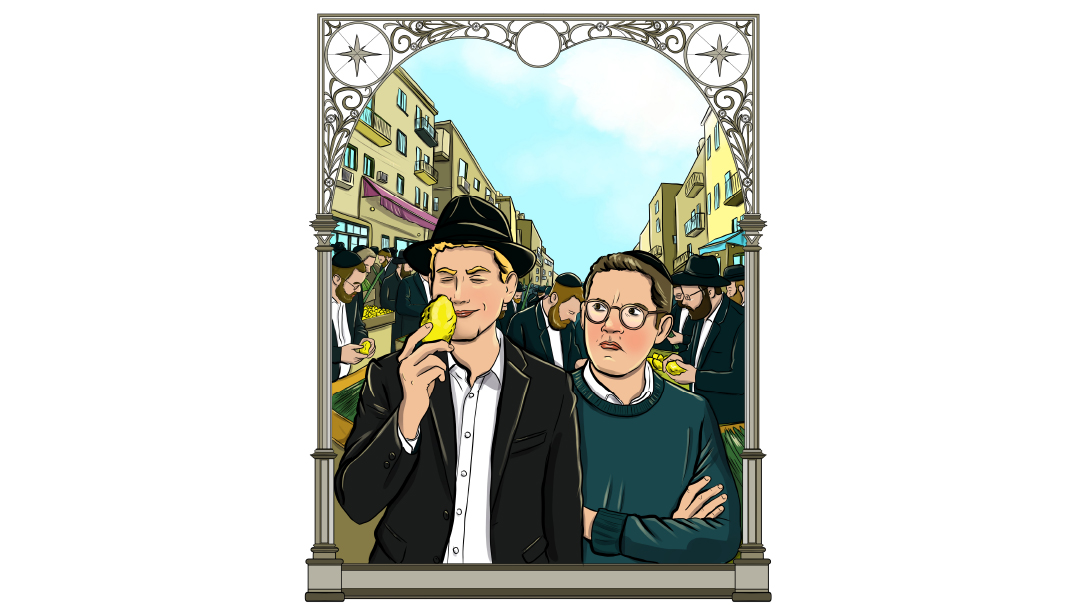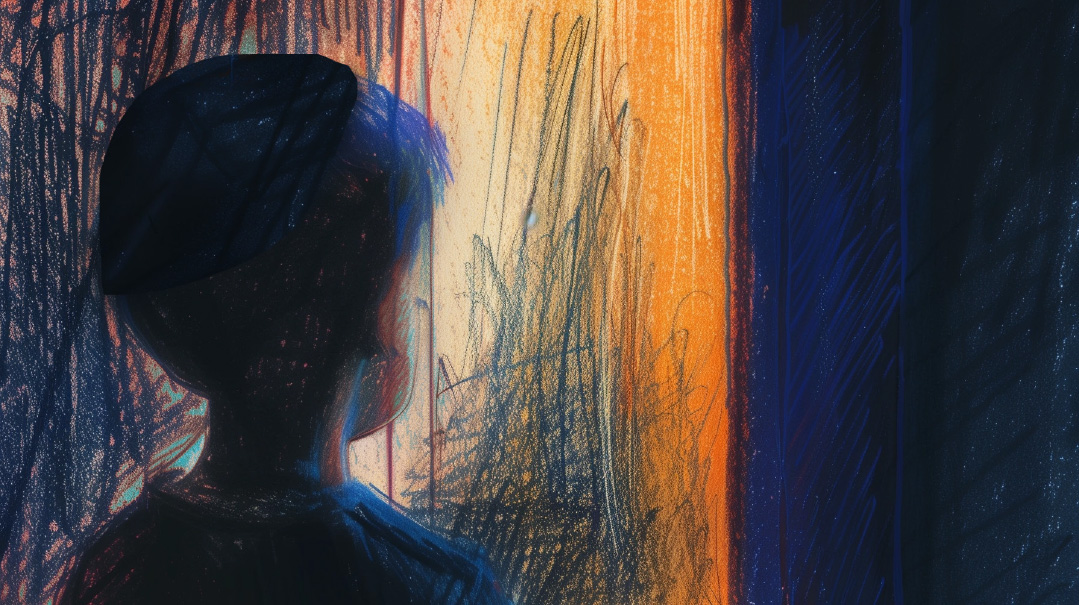Dynasty of Diamonds


BETWEEN THEM The budget. Ah the budget. That must be it that’s all that it is and yet it is all it is everything right now looming between them a roaring painfully quiet boulder that has wedged itself between the two of them
Y itzchak is crouched over the worn leather ledger when the buzzer sounds. A quick glance at the closed-circuit television reveals a young couple smiling shyly at each other. The girl wraps her woolen coat around herself a little tighter seemingly to protect herself from the harsh autumn winds. Yitzchak watches carefully. What coat of armor is she trying to build as a protection?
He notices even through the grainy pixels of the large screen the girl’s sure confidence the straight-backed pose that comes with wealth. Her clothing is designer; years in his uncle’s business taught him to recognize quality in fabric immediately. A quick glance at the boy: a black faded suit a beaten hat a small rip in the shirt. Yitzchak wonders if that’s the reason for the girl’s stance a clashing of socio-economic culture a couple raised separately in vastly different strata. He buzzes them in.
The couple brings with them the wind flushed cheeks the smell of cold. The boy — that’s all he is really a boy his body still lanky awkward as if he shot up overnight and isn’t quite sure what to make of these limbs; his eyes unlined; can’t possibly be more than 21 barely legal — whispers something in her ear and she is laughing but Yitzchak notices something in that laugh. There’s a barrier in that laugh. It comes from the throat not from the belly and for the briefest moment he watches the boy’s eyes flash in question.
And Yizchak wonders what it is this time. He’s seen too many kallos over the years to think everything is picture-perfect; often the smiles waver revealing turbulence as strong as choppy waves beneath eyes an internal storm of lightning and thunder. It’s the best-kept secret of engagement. When all the still-single friends crowd around to see the ring they don’t know about the hours of confusion that continue right up until the wedding. That feeling of what am I doing? What am I even getting myself into? And how do I really know?
Yitzchak always wishes there is something he could do to make it go away some advice that would ease the uncertainty. But he’s only a jewelry dealer and the only pearls he can produce are tangible. It’s frustrating the sheer desire to help to do but he has learned with time that the Eibeshter has His ways.
With a sigh he pushes the camel-colored ledger — now worn a supple milky feel to it softened from years and years of use — to the side. That ledger has served him well for over 40 years. It had been a gift from his wife Breina may she rest in peace. He shakes his head thinking himself a half-man still feeling lost without her after nine long years still forgetting at times when he desperately wants to share something with her a thought a funny encounter that she’s truly gone.
Yitzchak rouses himself to the couple before him and spreading his arms wide asks congenially “And how may I be of service to you today?”
The girl looks up almost surprised like he’s intruding on their private space. She catches herself rearranging her features deliberately delicately to smile at the old friendly man. Yitzchak notices that the smile doesn’t quite meet her eyes that despite her attempts she cannot erase the crease of concern tattooed between her eyebrows.
Years in the field have given Yitzchak an education. He has watched people, observing quietly. A nod here, a grimace there; the subtleties of discomfort, of unhappiness. Yitzchak would often say, only half in jest, that he’s been witness to the parts of people that are far darker than they wish to reveal.
Before he can analyze the girl’s features further, she is peering over the glass, looking at the bracelets, diamond strips glittering against the black velvet, a Milky Way of dreams in a midnight sky. The tall boy coughs lightly, intently, catching Yitzchak’s eye with his own.
“Yeah, um…” The boy clears his throat again, nervousness making him appear even younger, his voice cracking as it surely did at his bar mitzvah leining. Yitzchak smiles encouragingly. The boy glances at his kallah, as if she can fill his depleted confidence once more, remind him that he is indeed a chassan. “Can we please see the engagement rings?”
A smile, shared.
“With pleasure,” Yitzchak says, pointing further down to the rings. As they approach the far end of the small store, Yitzchak takes the camel-colored ledger and places it under his desk.
A memory: Breina coming home, clutching a parcel to her chest. Yitzchak was sitting at the kitchen table with papers and papers laid out in front of him, pounding on their electronic calculator. Breina often poked fun at him for his obsession with his “toy,” and she was probably right; he used it more than was actually necessary, but the sheer wonder of the LED display amazed him every time. It was a big change from the mechanical Curta calculator, that was for sure. He looked up from the numbers he was crunching to smile at her, a warm smile filled with understanding and love.
It was their ten-year wedding anniversary, and it had been a challenging year. With his decision to leave his uncle’s clothing company to start out in the diamond industry, things were tough. But after 13 years working in the same store, day in, day out, he was ready for something different. He had realized that there wasn’t really any hope of advancing beyond his current responsibilities, and something inside made him crave more.
Yitzchak knew, deep down, that this newness he was seeking had very little to do with actual business acumen. He had never worked in jewelry in his life. But there was something alluring, something deeper, gaping, that needed to be sealed, and he recognized, deep down, that he hoped the diamonds would fill the void where children might have been.
Breina smiled as she closed the door, entering the same, one-bedroom apartment they had first rented when they were newly married, all those years ago. He looked at her, trying to read her expression, wondering. It had indeed been a trying year, yet Breina had stood by his side. “Through thick and thin,” she had said when they had to take out another loan from the bank. “Through thick and thin,” she had said when their electricity was shut off because they were behind on a payment. “Through thick and thin,” she reminded him when he made his first big purchase of jewelry, and realized, too late, that he had been swindled. He had had to sell it all at cost.
She knew that the diamonds had nothing to do with money at all. Oh, sure, Yitzchak had told her that financially, it would be more lucrative to own his own business. And he did believe that. But both of them knew money wasn’t a priority. Yet she never said anything, never hinted that it wasn’t just about the extra income. She knew the pain he carried; she carried it herself, in her own quiet way. And she let him deal with it, mourn, heal, in his manner, encouraging the process in her silent support.
And now, she was standing in front of him, holding a package covered in brown wrapping paper.
“Happy anniversary, sweetheart,” Breina said, handing him the present as it crinkled beneath her fingers.
It was a beautiful camel-colored ledger, made of rich leather. She had purchased it after taking a personal loan from her sister.
“You’re going to use this well, Yitzchak.” Her voice full of promise, of encouragement, of confidence. His heart had swelled at her utter belief in him, in thanks that she never verbalized what they both knew to be true. She was too good, too altruistic, to point out his ever-present grief. And perhaps optimistic, too, that for one of them, the grief would be abated with distraction.
Five years later, in thanks for all she had done, both said and unsaid, he presented her with a pear-shaped diamond, encrusted with two baguette sapphires. “Thank you for believing in me,” Yitzchak said, his voice choked with emotion.
Breina fingered the ring, smiling. “The ring… Past, present, future, through thick and thin. We’re building a dynasty, Yitzchak. We are.” There was an allusion, wasn’t there, that perhaps there was still a chance, perhaps after all this time, Hashem would answer their tefillos with a long-awaited salvation.
Yitzchak had gulped hard.
The memory of those days feels bittersweet, and he feels worn and old and wrung-out. She had been right, after all. He had used the ledger well as his business slowly, steadily, grew, replacing the inner pages year after year, his collection of sales building up in the filing cabinet. And yet, the dreams of a dynasty she had spoken of, still hoped for after 15 years of marriage, receded from him on that day.
He viewed the ledger as a sort of symbol, representing a token of surrender, an acceptance of his new definition as a diamond dealer. Like a dried-up leaf on a frosted winter tree, the hope had slowly withered, and finally, detached, as he recognized that he no longer longed for his self-definition to include the term “father.” After 15 years of marriage, he had indeed come to terms with it, knowing that his lineage would end with he alone, Yitzchak. But the Eibeshter had provided in other ways: a steady, solid income, a wonderful, trusting marriage, as strong as the stones he dealt with.
Bringing himself back to the present, Yitzchak looks over at the young couple again. There’s something about them. He watches them comparing the rings, slightly hunched, the glass and bright overhead lights playing tricks with their faces. She is trying them on, one at a time, eliminating the ones that aren’t to her taste. Yitzchak hovers at a distance, but close enough to be of service. He has learned to respect the customers’ process when choosing, and stands at alert, welcoming questions or help when needed.
The girl picks up a newer piece, a round, perfect gem with a halo created by intersecting waves from either end. She fingers the price tag gently, cocking her head just so, inconspicuous to her chassan, but very real to Yitzchak. With an imperceptible sigh, she places it back on the board.
“Don’t see anything you like?” questions her chassan, beseeching, pleading.
“Is there any way…” she begins to ask, but Yitzchak sees the chassan give a quick shake of his head. No, we have to stay in the budget.
The budget. Ah, the budget. That must be it, that’s all that it is, and yet, it is all, it is everything right now, looming between them, a roaring, painfully quiet boulder that has wedged itself between the two of them.
She had seen past it all, good for her, Yitzchak thinks. She realized a gem when she saw one, even if it was covered in coatings of grime. Yet Yitzchak notices the internal struggle, the questions what will everyone say, wondering when they see the ring her chassan had bought for her. Social pressures are so very real, run so very deep, and the worry and concern has drawn deep lines on her otherwise youthful face.
Yitzchak knows he is hearing her thoughts as clearly as if they were racing through his own mind. How to protect his feelings, to make him feel she is still happy, without her expressing her own pain, confusion, disappointment? Yitzchak stands back, watching from afar, seeing her wage an internal war with herself, as her chassan lets out a whoosh from his mouth, making his whole body seem to deflate, defeated.
“Is there any way I can help?” Yitzchak asks gently, trying to remain unobtrusive.
“Umm…” the boy stutters, falters. “Is there anything else in our price range you can show us?”
Yitzchak thinks. Generally, there is so very little he can do or say to help, but this time, things are different. After a brief moment of deliberation (he knows the true value, he knows this barely covers any of the cost, but it is second-hand, after all), he pulls out a pear-shaped diamond, encrusted with two baguette sapphires.
“Oh…” the kallah inhales, her eyes flush with pleasure. This is the one, Yitzchak hears the girl’s thoughts again, and he knows. He has waited for the right time, the right kallah. Breina was correct again, after all this time, and Yitzchak is sure he can almost see her soft smile, expressing deep satisfaction.
They will leave behind a dynasty.
(Originally featured in Family First Issue 542)
Oops! We could not locate your form.













